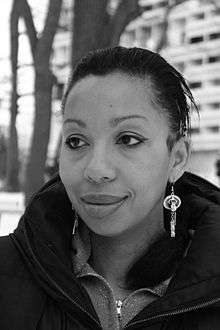Marie NDiaye
| Marie NDiaye | |
|---|---|
 | |
| Born |
4 June 1967 Pithiviers, Loiret, France |
| Occupation |
Novelist Essayist Playwright |
| Period | 1984–present |
Marie NDiaye (born June 4, 1967, in Pithiviers, Loiret) is a French novelist and playwright. She published her first novel, Quant au riche avenir, when she was 17. She won the Prix Goncourt in 2009. Her play Papa doit manger is part of the repertoire of the Comédie française.
Biography
Ndiaye was born in Pithiviers, France, less than a hundred kilometers south of Paris, to a French mother and a Senegalese father. She grew up with her mother in the suburbs of Paris. Her parents met as students in the mid 1960s, but her father left for Africa when she was only one year old.
She began writing at the age of 12. As a senior in high school, she was discovered by Jerome Lindon, founder of Editions de Minuit [Midnight Publications], who published her first novel, Quant au riche avenir.[1] After her first novel she wrote a further six, all published by Minuit, and a collection of short stories. She also wrote her Comédie Classique, a two-hundred-page novel made up of a single sentence, which was published by POL when she was 21 years old. As well as writing novels, NDiaye has written a number of plays and a screenplay. Papa doit manger is only the second play by a female writer to be taken into the repertoire of the Comédie française.
In 1988, NDiaye wrote a letter to the press in which she argued that her novel La Sorcière, published two years later, had strongly informed the content of Naissance des fantômes, the second novel of successful author Marie Darrieussecq.[2]
Her novel Trois femmes puissantes won the 2009 Prix Goncourt.[3] In his 2013 critical study of the author, Marie NDiaye: Blankness and Recognition, British academic Andrew Asibong describes NDiaye as "the epitome of a certain kind of cultural brilliance",[4] arguing elsewhere in the book, a psychoanalytic exploration of the writer's evocation of trauma and disavowal, that "NDiaye's work explores the violence done to the subject's capacity for feeling and knowing".[5]
Exile in Berlin
In an interview published by Les Inrockuptibles on August 30, 2009, NDiaye declared about Sarkozy's France, "I find that France monstrous. The fact that we [with her companion (the writer Jean-Yves Cendrey) and their three children-- editor's note] have chosen to live in Berlin for two years is far from being unrelated to that. We left just after the elections, in a large part because of Sarkozy, even if I am very aware that saying that can seem snobbish. I find that atmosphere of vulgarity and heavy policing detestable ... Besson, Hortefeux, all of those people, I find them monstrous".[6]
Awards and honours
- This list is incomplete; you can help by expanding it.
- 2001 Prix Femina, Rosie Carpe
- 2009 Prix Goncourt, Three Strong Women
- 2015 Nelly Sachs Prize[7]
Works
Novels and short stories
- Quant au riche avenir - Minuit, 1985 (ISBN 2-7073-1018-2)
- Comédie classique - P.O.L., 1988 (ISBN 2-86744-082-3)
- La femme changée en bûche - Minuit, 1989 (ISBN 2-7073-1285-1)
- En famille - Minuit, 1991 (ISBN 2-7073-1367-X)
- Un temps de saison - Minuit, 1994 (ISBN 2-7073-1474-9)
- La Sorcière - Minuit, 1996 (ISBN 2-7073-1569-9)
- Rosie Carpe - Minuit, Prix Femina 2001 (ISBN 2-7073-1740-3)
- Tous mes amis, nouvelles - Minuit, 2004 (ISBN 2-7073-1859-0)
- Autoportrait en vert - Mercure de France, 2005 (ISBN 2-7152-2481-8)
- Mon cœur a l'etroit - Éditions Gallimard, 2007 (ISBN 978-2-07-077457-9)
- Trois femmes puissantes - Gallimard, Prix Goncourt, 2009 (ISBN 978-2070786541)
- Ladivine - Gallimard, 2013 (ISBN 978-2-07-012669-9)
- Ladivine: a novel; an English translation. Knopf April 26, 2016. (ISBN 978-0385351881)
Plays
- Hilda - Minuit, 1999 (ISBN 2-7073-1661-X)
- Papa doit manger - Minuit, 2003 (ISBN 2-7073-1798-5)
- Rien d'humain - Les Solitaires Intempestifs, 2004 (ISBN 2-84681-095-8)
- Les serpents - Minuit, 2004 (ISBN 2-7073-1856-6)
Children's novels
- La diablesse et son enfant, illustration Nadja - École des Loisirs, 2000 (ISBN 2211056601)
- Les paradis de Prunelle, illustration Pierre Mornet - Albin Michel Jeunesse, 2003 (ISBN 2226140689)
- Le souhait, illustration Alice Charbin - École des Loisirs, 2005 (ISBN 2211079628)
Essays
- La naufragée - Flohic, 1999 (ISBN 2842340620)
Screenplay
- White Material (2009), co-written with director Claire Denis
References
- ↑ Libre d’écrire, portrait dans Le Monde du 3 novembre 2009
- ↑ Marie NDiaye polémique avec Marie Darrieussecq dans Libération du 3 mars 1998
- ↑ Novelist NDiaye wins France's top literary prize
- ↑ Andrew Asibong, Marie NDiaye: Blankness and Recognition, Liverpool University Press, 2013, p. 9
- ↑ Andrew Asibong, Marie NDiaye: Blankness and Recognition, Liverpool University Press, 2013, p. 13
- ↑ L'écrivain Marie Ndiaye aux prises avec le monde interview de Marie NDiaye par Nelly Kaprielian dans Les Inrockuptibles du 30 août 2009
- ↑ "Marie N’Diaye erhält Nelly-Sachs-Preis". dortmund.de (in German). September 7, 2015. Retrieved September 8, 2015.
External links
| Wikimedia Commons has media related to Marie NDiaye. |
- Bio-bibliographie de Marie NDiaye - The University of Western Australia
- Marie Ndiaye, in Label France (magazine), No.59 2005
- Critical bibliography (Auteurs.contemporain.info)
- "Où situer Marie Ndiaye?" by Véronique Bonnet (in French)
- The U.S. premiere of Hilda
- Marie NDiaye at the Internet Movie Database
|